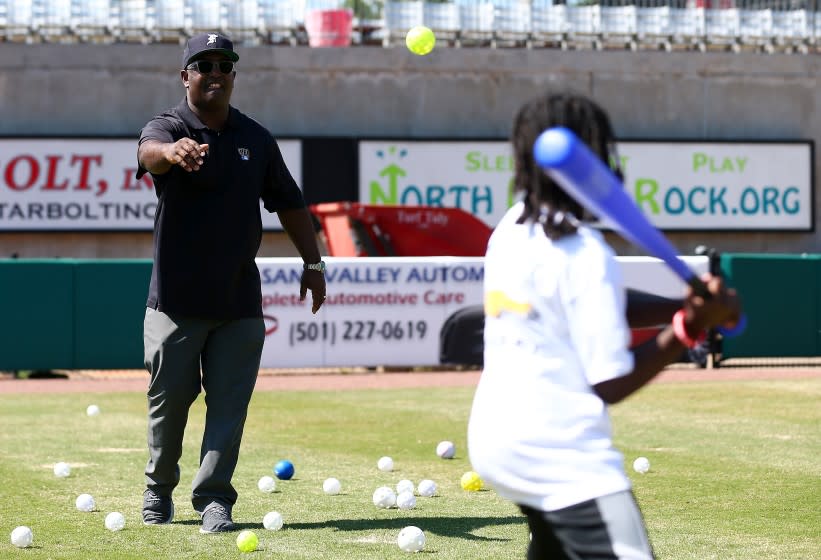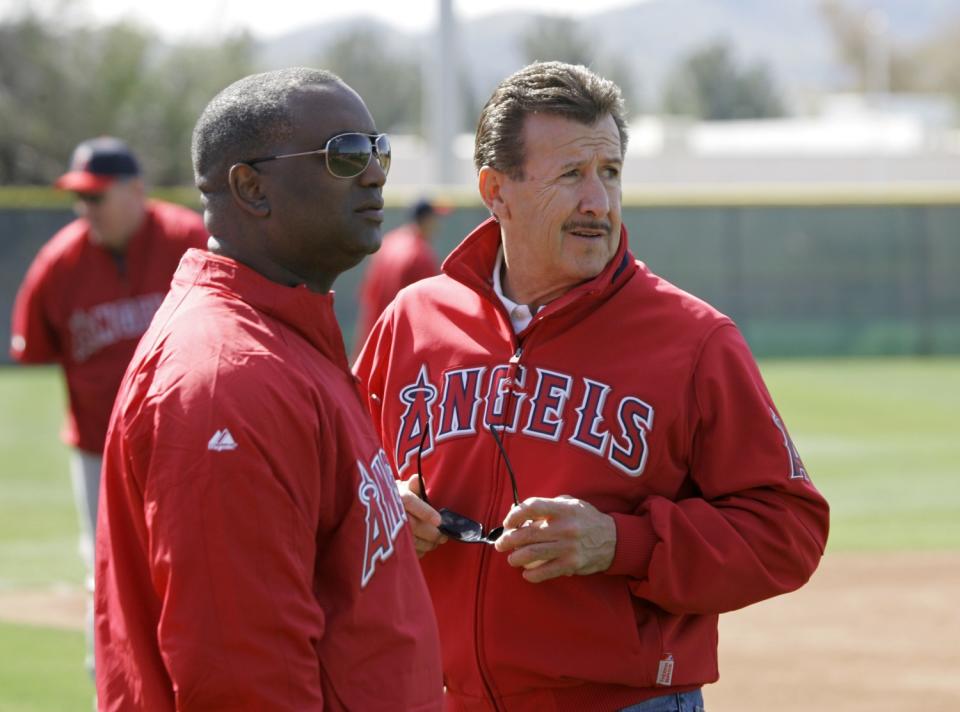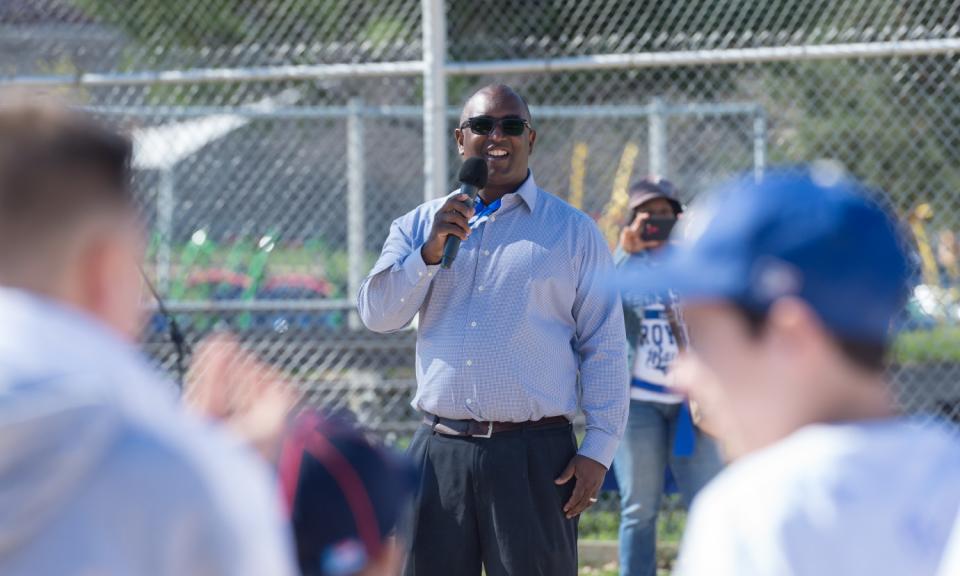A familiar face leads MLB efforts to grow baseball in underprivileged communities

A lot of titles apply to Tony Reagins.
Former Angels general manager. High-ranking Major League Baseball executive. A leading voice in baseball’s efforts to increase diversity, inclusion and participation. A driving force behind its outreach to youth players at the grassroots level.
Hired by MLB as a senior vice president for youth programs in 2015, and promoted to Chief Baseball Development Officer last August, he oversees a department of roughly 100 people tasked with dozens of programs aimed at growing the game and using the sport as a vehicle for change.
“They’re real programs with real young people that have real impact,” he said. “That's what we really try to emphasize — being a good person, being a good teammate, going to college, and not only impacting yourself, but then going back into your community and impacting the lives of those around you.”
Some might brush aside such a characterization, cynical of MLB’s checkered past with outreach efforts, especially those involving underserved communities.
But it’s a narrative that Reagins, 54, has spent the last half-decade trying to change — motivated by another defining feature he proudly recalls from his past.
“I grew up [going to] the Boys and Girls Club of the Coachella Valley,” the Indio native said by phone recently, reflecting on humble beginnings that still guide him today. “I've always been a Boys Club kid.”
It’s one of the many things that sets Reagins apart from other power brokers in baseball’s hierarchy, a back story that mirrors many of the underprivileged players he’s been tasked to work with now.
“To have someone who has lived this life and has had the struggle and has had to work really hard to get recognized and move up,” said Darrell Miller, who works with Reagins as MLB’s vice president of youth and facility development, “it gives us a lot of peace — because he knows.”
Reagins came up in baseball as an outsider. He never played professionally or in college. It wasn’t even his primary sport growing up, instead playing football at Indio High. But after graduating from Cal State Fullerton in 1991, he got a marketing internship in the Angels’ community relations department and his career blossomed.
At first, his roles were concentrated on the business side. He spent game days interacting with fans. He coordinated autograph obligations with players. He tried to add a personal touch to the Angels’ MLB brand.
“He worked so hard, and he slept so little,” said Miller, a former Angels player in the ‘80s who was the club’s director of community relations when Reagins was hired.
By the late ‘90s, Miller and Reagins — who also later became brothers-in-law — had transitioned to the baseball side of the organization. Miller served as the Angels’ director of player development. Reagins was his right-hand man as manager of baseball operations, quickly displaying a knack for scouting but also forming personal connections with prospects throughout the farm system.
“He was so good at handling people,” recalled former Angels general manager Bill Stoneman. “I said, ‘Hey, this is a guy who should climb the ladder.' ”
Climb Reagins did, succeeding Miller in running the club’s minor league system in 2002 before taking over as general manager once Stoneman stepped down after the 2007 season. Only the fifth Black general manager in MLB history at the time, Reagins guided the Angels to a 363-285 record and two AL West titles over the next four years. He signed Torii Hunter, traded for Mark Teixeira and oversaw the 2009 draft in which the team selected Mike Trout 25th overall.

He resigned abruptly after the 2011 season after the Angels missed the postseason two years in a row and he'd made dubious trades for Scott Kazmir and Vernon Wells. Reagins stepped back from the sport for the next three years.
But then his phone rang in 2015, with MLB offering him the chance to run their grassroots and youth participation initiatives. He immediately thought back to his childhood in the Boys and Girls clubs. He jumped at the chance to create something similar.
“Some people have asked me, ‘What's more important? Being the GM of the Angels or the work that I'm doing now?’” Reagins said. “I answer, when you're the GM of a team, it's just about winning the World Series. This job is about changing lives, creating opportunities, and giving kids a chance they may not ordinarily get. If you can do that, I think that's more important, at least in my mind.”
MLB had been operating several youth-level programs long before then. In 1991, it took over operation of the Reviving Baseball in Inner Cities initiative. And over the last two decades, it has opened several Urban Youth Academies throughout the U.S and Puerto Rico, including a Compton-based campus that Miller has headed since it opened in 2006.
But it wasn’t until Reagins’ arrival that the league created a separate department dedicated to such outreach programs, giving him the resources to expand existing efforts and pursue new ideas.
Shortly after his hiring, the league launched a “Play Ball” initiative to help grow general participation in the sport (before the pandemic, overall participation had grown 20% since 2014, according to the Sports & Fitness Industry Assn). But MLB also founded diversity-focused programs such as the Breakthrough Series and ID Tour — which, as Reagins happily noted, have gained enough popularity to routinely require sign-up wait lists.
“All these programs now are well-known in diverse circles,” he said, “[and they] didn’t exist five years ago.”
The Youth Academies, meanwhile, began offering their young players educational courses, SAT prep classes and broadcasting opportunities in addition to baseball instruction.
“We’ve broadened the things we can do,” Miller said. “We created things that were outside the box that have taken us to a different level.”
An emphasis on softball and girls baseball was introduced, as well as international growth through coaching development programs.
“It’s a lot like being a farm director,” Reagins said of the job. “Because a lot of times, everything is spread out across the country so things aren’t right at your fingertips. But you’re relying on solid people, people that are capable of executing the plan.”

But according to Miller, it’s Reagins who ties it all together — something that became especially evident during the past year, when the pandemic wreaked havoc on their programs right as social reckonings across the country put renewed emphasis on their efforts.
“When someone knows the struggle, you approach it and communicate it in a whole different way,” Miller said. “And what I mean by ‘struggle’ is, these inner-city programs that we run, particularly in Compton and that South Central [Los Angeles] area, it’s very difficult on a day-to-day basis to do what we do and know what to say and how to proceed. He gets it.”
It’s because, for all he’s accomplished, it’s the lessons Reagins learned that he now wants to give back.
“When I had the opportunity to come to New York and develop programs for the national scale that could do the same thing, create opportunity, share my story, and really give kids that may not have access to our sport, give them access — it was a slam dunk,” he said. “We know we have an opportunity to change a generation. And that's what we do every day.”
This story originally appeared in Los Angeles Times.

